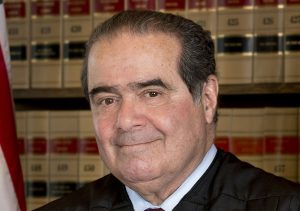Supreme Court Justice Antonin Scalia’s death in February set off a political firestorm concerning potential nominees and the timing of the replacement. Advocates on both sides of controversial issues, including abortion, are weighing in. Pro-lifers are concerned that a nominee put forth by pro-abortion President Obama would provide the fifth liberal vote on the Court to take away all meaningful authority to protect unborn children and regulate abortion.

Scalia, counted among the Court’s conservatives was known for his brilliant defense of textualism — the concept that the U.S. Constitution is to be read, understood, and applied in keeping with the language, syntax and vocabulary of its text as it was intended by the framers. He argued against liberal jurists who claim that the Constitution is to be interpreted as a “living text,” meaning whatever a judge wants it to mean today.
The Roe v. Wade decision, which legalized abortion, is a perfect example of what interpreting the Constitution as a living document can mean. In 1973, seven justices somehow found a right to abortion in the “penumbra” (shadow) of the Constitution. Forty-six years later, over 58 million unborn babies have been aborted in the United States.
Scalia said of the decision, “My view is that regardless of whether you think prohibiting abortion is good or whether you think prohibiting abortion is bad, regardless of how you come out on that, my only point is the Constitution does not say anything about it. It leaves it up to democratic choice. Some states prohibited it and some states didn’t. What Roe v. Wade said was that no state can prohibit it. That is simply not in the Constitution.”
Following Scalia’s death, arguments over his replacement began in earnest. President Obama promised to put forth a nominee and urged the Senate to act soon, which pleased progressives hoping to add an additional liberal to the court. Republican leaders insisted they would not act on a nominee until after the November election.
Several Democrats who insist that the Senate vote on Obama’s nominee are on record in years past as fighting against confirmation hearings when it served their political purposes. In 2006, then-Senator Obama voted for an unsuccessful filibuster against Judge Samuel Alito, as did Hillary Clinton, Harry Reid, Patrick Leahy, and Charles Schumer, who urged Democrat senators to reject any nominee during the remaining 18 months of President George W. Bush’s term. In 1992 then-Senator Joe Biden argued that a vacancy on the Supreme Court should be left open for the next president to fill.
Washington Post fact checker Glenn Kessler gave “three Pinocchios” (meaning “significant factual error and/or obvious contradiction”) to the Democrats’ assertion that Republicans have a “constitutional responsibility” to at least hold hearings and vote on a nominee. Tony Perkins, president of Family Research Council, explains, “President Obama has the right to nominate a replacement for Justice Scalia, just as the Senate has a right to ignore it.”
On March 16, Obama nominated federal judge Merrick Garland, chief judge of the United States Court of Appeals for the District of Columbia Circuit. While Garland does not have a long paper trail, he sided with the majority in a case that forced a pro-life group (Priests for Life) to obey the HHS mandate, requiring the group to pay for abortion-causing drugs for employees. Garland has also praised Supreme Court Justice Harry Blackman, who wrote the Roe v. Wade decision which legalized abortion, calling Blackmun’s court papers “the greatest gift to the country.” Planned Parenthood has praised Garland’s nomination and Planned Parenthood CEO Cecile Richards was seen at the White House following Obama’s nomination announcement.
There is no question that the court vacancy is important in the minds of voters. A WPA Opinion Research poll shows 64 percent of likely voters (71 percent who identify as Republicans and 63 percent as Democrats) agree that the Supreme Court will be “an important factor in determining who you vote for in November’s elections.” Voters realize that the next president will likely appoint two or even three justices to the Supreme Court whose decisions will impact our nation for decades to come.
An important case now before the court at the time of Scalia’s death is Whole Women’s Health v. Hellerstedt., in which the court will consider Texas House Bill 2. This law requires an abortionist to have admitting privileges at a hospital and mandates that abortion facilities meet standards set for ambulatory surgical centers. Opponents, including Planned Parenthood, insist that the law creates an “undue burden” on women seeking abortions. National Right to Life President Carol Tobias disputes that charge, saying, “The abortion industry doesn’t like these laws because abortion clinics would be forced to spend money to meet basic health and safety standards. For them, this isn’t about ‘protecting’ the women they purport to help, it’s about preserving their cash flow.
Without Scalia on the Court, eight justices heard oral arguments. If there is a 4-4 tie on the case, the earlier Fifth Circuit’s ruling in favor of Texas will stand. To get to a 4-4 tie, the most likely scenario would be Justice Kennedy voting on the pro-life side. The Supreme Court, which is expected to rule by the end of June, can also hold the case until Scalia’s vacancy is filled.
Expect this issue to get significant attention prior to November’s General Election. Both Democrat presidential candidates have sworn allegiance to abortion; Republican candidates are pro-life. In coming months, pro-lifers will be called upon to push against the clamor to put a new pro-abortion justice on the supreme court.




